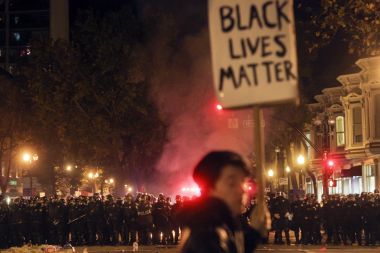Ferguson: why we should pray for Darren Wilson
Poor Michael Brown.

He was shot dead by police officer Darren Wilson on August 9. Initially portrayed as an innocent abroad, it was later found that he had committed a robbery. A grand jury believed Wilson's testimony that Brown had run at him with violent intent and that shooting him was a legitimate response to a threat.
Brown was black, Wilson was white. In a sign of the polarisation of some parts of American society, the refusal of the jury to commit Wilson for trial became an instant symbol of uneradicated racism. A white police officer can shoot a black man and nothing happens. How far has America come since Jim Crow? Not so far. Indeed, Lauren Williams on the Vox website has a fascinating piece about how Wilson's account, and its reception by many who came down on his side, echo the "terrifying racial stereotypes" which have been stock images in the US for decades. She concludes: "The Ferguson story is entirely about race."
No one can doubt the grief that this episode has left in its wake for Michael Brown's family. No one can doubt the passionate sense of grievance felt by many black people in the US, or doubt that it is justified, either. It is this sense of injustice that drove those who marched and demonstrated in towns across the US and even in London.
But, but. The trouble is that nothing is ever entirely about anything. The imposition of a particular political and social narrative on the brute facts of what happened inevitably obscure as well as enlighten, twist the truth as well as tell it. And once this binary opposition between the forces of good and the forces of evil is set up, it becomes essential to the story that the two protagonists, Michael Brown and Darren Wilson, incarnate the roles they have been allocated. So Brown is the gentle giant who wouldn't hurt a fly; Wilson is the trigger-happy closet racist who looks at a black man and sees an enemy. That being the case, of course the grand jury was wrong not to charge Wilson, and of course its members were morally and institutionally corrupt.
We ought, though, to try to be honest: and honestly, that's not how it was. Would Brown be alive today if he were white? We don't know. Would he be alive if Wilson were black? Again, we don't know. What about if both colours were reversed, and a black police officer were faced with shooting a white man? Tragically, it's far, far less likely: but again, we don't know the answer.
What we do know are statistics, probabilities: and here the evidence is all on the side of the protesters. But people are not probabilities, and reducing individuals to symbols is to do them – both of them – a fundamental injustice. It denies their own moral freedom to choose right from wrong. It assumes, in the absence of evidence, that the choice of one of them, Darren Wilson, was self-evidently wrong – and that consequently the choice of the grand jury was wrong too.
In a powerful address at a conference recently, theologian Miroslav Volf said that "every untruthfulness is a mode of injustice". Reflecting on own experience of telling the story of his interrogation at the hands of Yugoslavian secret police, he said: "I had a responsibility to tell my story rightly, or I would wrong another person. You can't forgive or apologise unless you have told the story rightly."
One of the gifts, and the challenges, brought by Christianity to human relationships is the insistence that every individual is uniquely loved by God and valuable to Him. No one is just an extra in someone else's story, whether that is the story of nation, creed or race. Michael Brown was not just an extra, but neither was Darren Wilson. He, incidentally, is to resign from the Ferguson Police Department and perhaps leave policing altogether.
There is a responsibility to tell the story rightly. One Chicago minister, Pastor James MacDonald, has issued a call for clarity. "Can you let your heart be moved with compassion and seek to be moved for the impossible predicaments of real people on both sides of this? Come on Christians – the essence of Christ's compassion is hearing what the person in pain is saying and feeling and walking a few feet in their shoes. We are called to compassion for everyone [on] all sides of this escalation not taking a single simplistic viewpoint and thereby 'crossing by on the other side of the road'."
The trouble is that there is so much truth in the story that this is all about race, so little trust in the legal and political process, and so much eagerness to believe the worst about a white police officer with a gun, that calls for Christ-like compassion are unlikely to be heard.











